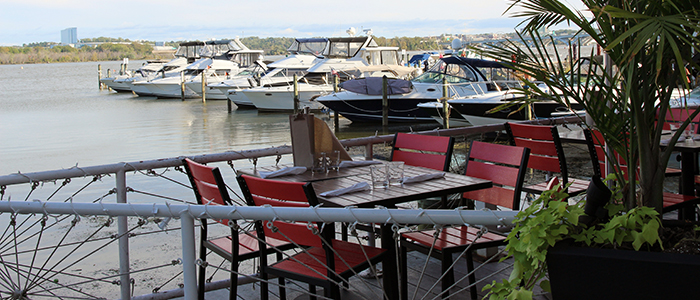Virginia and others are rocking pandemic relief to restaurants

Waterfront restaurant with a view on the Potomac River, Old Town Alexandria, Va
Thanks to the Virginia Restaurant, Lodging & Travel Association, Richmond, Va., hospitality businesses in Virginia are getting more pandemic relief in the form of state, county and local grants and programs designed specifically for them. The VRLTA has spearheaded efforts to make sure government funds are earmarked for its members, with great success.
To offset economic damage done to businesses during the pandemic, the American Rescue Plan Act (ARPA) passed earlier this spring made money available directly to restaurants through Restaurant Revitalization Fund grants.
Those funds quickly ran out, though both the Association and state groups continue to lobby for more funding for the program. But the ARPA also disbursed money to state, county and local governments for the express purpose of helping households, small businesses and nonprofit groups recover from the effects of the pandemic or provide “aid to impacted industries such as tourism, travel and hospitality.”
Setting new goals for relief
“When we understood the basics of the ARPA legislation, we developed a plan together with our member industries,” says Eric Terry, president, VRLTA, “We wanted to ensure that the state, county and city governments recognize the intent of the law and understand the needs of our members.”
ARPA legislation leaves disbursement and use of $350 billion in funds up to state, local and tribal governments and encourages funds to be devoted to the hospitality industry. VRLTA’s plan offers specific recommendations on the best and fairest use of the available funds.
Initially, VRLTA focused on Virginia’s General Assembly. VRLTA’s recommendations were sent out in March to assembly members, and Terry, VRLTA staff and members conducted one-on-one calls with 30 out of 34 Virginia House Appropriations and Senate Finance committee members, asking the state to carve out $291 million for industry members.
The legislative process at the state level, however, can be slow.
More effective, local approach
“We still have to make a case at the state level,” Terry says, “but cities and counties are closer to the pain. We saw them working to address relief plans faster, so we started spreading the word.”
Fairfax County was the first to jump on board with a relief plan. Armed with $222 million in ARPA funds, the county carved out $25 million for hospitality-related businesses and created a program called PIVOT.
The program offers grants to businesses in four categories: foodservice (including food trucks); lodging; retail, services and amusements; and arts organizations, museums and historical sites.
Foodservice grants—up to $18,000—are based on annual sales up to $3.5 million. Food trucks get a flat $1,500. Lodging grants are $400 per room. The county accepted grant applications through July 9.
“We’re working with Fairfax County officials now to make sure grants are based on 2020 income, not 2019 income,” Terry says.
Consistent messaging
With Fairfax and Loudoun Counties already developing programs, VRLTA staff put together a PowerPoint outlining their members’ needs to present to city and county governments. Terry and his staff have already conducted several presentations.
VRLTA also has organized a coalition of business and hospitality organizations and hundreds of tourism businesses across Virginia that have signed on in support of the recommendations to be presented at an Aug. 2 special session of Virginia’s General Assembly .
In the meantime, VRLTA successfully lobbied for an extension of an “alcohol-to-go” bill for one year and held off an increase in the state’s tipped wage in 2020.
The association also influenced an outdoor refreshments law, which allows for increased frequency and longer duration for local special events covered under an ABC license. It also helped to institute a requirement that food delivery services must reach an agreement with the restaurant prior to delivering food from that restaurant.
“What’s happening in Virginia is in line with key components of the Association’s ‘Blueprint for State and Local Rebuilding,’ and can serve as a model for other states,” says Mike Whatley, the Association’s vice president for state affairs and grassroots advocacy.
“Hospitality associations and operators need to engage county supervisors, city managers and other legislators to have the discussion,” says Terry. “Use Fairfax County as an example. Give decision-makers a template for what you want relief efforts to look like.”
Other areas of the country that have established state and/or local relief programs for restaurants with ARPA funds include Ohio, New Jersey, New York, Chicago and Cook County, Illinois.